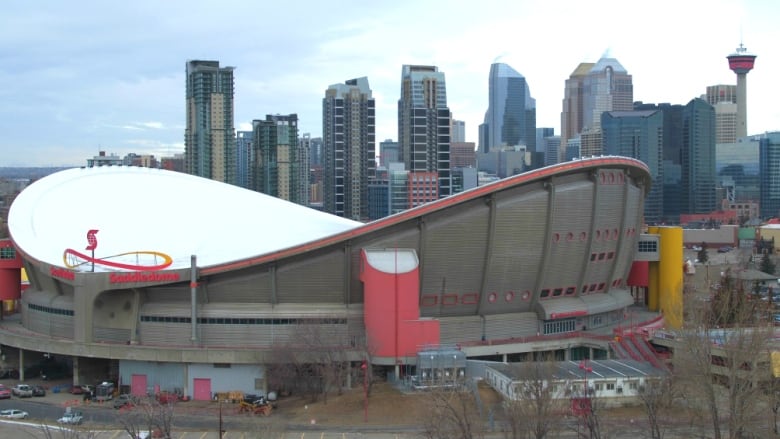Calgary rejects Olympic plebiscite, expects to make final decision next year on 2026 bid
More study needed in light of recent IOC changes, says group evaluating potential bid on Winter Games

Calgary is capable of hosting the Olympicsin 2026 but whether or not that's a good idea remains an open question that can't yet be answered, city council was advised Monday.
That was the conclusion after $3 million worth of work by the Calgary Bid Exploration Committee (CBEC), which presented its recommendation to the mayor and city councillors.
"Our committee found that the answer to the question of feasibility'Can we host the Games?'is clearly yes,"CBECchair Rick Hanson said in a statement.
"But the question of 'Should we bid?' requires more work in light of new information."
That new information is largely related to the International Olympic Committee's recent decision to push back deadlines and change its candidature requirements for the 2026 Olympic Winter Games.
Those changes have made the Olympic question "more complex," CBEC said in a release.
"In addition, the new host city requirements from the IOC have yet to be released, which will contain information that will be critical to the city's deliberation and could also present material changes toCBEC's current proposedconcept," the release added.
Calgary city staff who must make a final recommendation of their own before city council ultimately decides whether or not to bid said they had only received CBEC's recommendation on Friday afternoon and need more time to assess it.
A recommendation from city administrators is now due back atcouncil on July 31.
Mayor Naheed Nenshisaid there's little doubt Calgary will need more time to make a decision in light of the recent IOC changes.
"I will be shocked if administration comesback next weekwith anything other than arecommendation that says,'Don't make a decision until you know more from the IOC,'" Nenshi said.
The mayor has previously said he doubts Calgary will make a decision until after the Olympic Winter Games in Pyeongchang, South Korea, in February 2018.
$2.4B cost estimate could change
City council voted in June 2016 to allocate $5 million to study the feasibility of another Olympic bid, after Calgary hosted the 1988 Winter Games.
That led to the creation ofCBEC, which is projected to have spent only about $3 million of that total.
Last month, CBECreleased a report estimating it would require $2.4 billion in public funding to cover the shortfall between revenue and costs if Calgary were to host theOlympics in 2026.
That doesn't include the cost of building a new, NHL-calibre arenasomething the city is currently in the process of negotiating with the group that owns the Calgary Flames.
The bid explorationcommittee has said two "full-sized arenas" wouldbe necessary to host the games.
Nenshihas said he's "not a big fan" of the $2.4-billion price tag, which would likely have to be covered by a combination of funds from the federal, provincial and municipal governments.
But Hanson said Monday the cost estimates could change substantively, depending on what the IOC does in the coming months.
Plebiscite rejected
City council also voted Monday against the idea of putting the Olympic bid to a plebiscite attached to the regular ballot in the October municipal election.
Coun. Sean Chu proposed the idea, saying the matter should be decided directly by the citizens of Calgary.
"I think it's important to listen to what the citizens are saying and I'm not afraid to listen," Chu said.
But numerous councillors questioned how voters could make an informed decision at that time when key information from the IOC might not be available until 2018.
Coun. Brian Pincottalso described a plebiscite as politically cowardly.
"You can't just hide behind a plebiscite whenever it's controversial or difficult or you don't really want to put your name on the line and upset somebody," he said.
The plebiscite idea was rejected by a 13-2 vote, with Chu and Coun. Joe Magliocca voting in favour.
What's next?
Council will decide on next steps after hearing the report from city staff on July 31.
It's possible council will extend CBEC's mandate and ask a pared-down committee to continue exploring a potential bid using funds that have yet to be spent from its $5-million budget.
"If there's more work to be done, we're prepared to take on that work," Hanson said.
Nenshi said it's possible council could kill the bid idea altogether next week but he doubts that would happen.
The mayor expects a final decision to be made next year.
If the committeewere to continue exploring a bid in conjunction with city staff, Hanson said he would expect it would take until early 2018 to work out a reasonable plan under which Calgary could make an Olympic bid.
With fewer cities expressing an interest in the Olympics and raising more concerns about costs, Hanson said he's optimistic Calgary could find an arrangement with the IOC that is less burdensome than previous Olympics have been on host cities.
"I would never classify anybody as desperate without knowing what's going on in their head, but I can tell you we're in a really good position to negotiate," Hanson said.
Continuing on with the exploration process would require both the provincial and federal governments to remain open to financially partnering with the city, Nenshi noted.
"Frankly, if either of them says no, we're done," the mayor said.












_(720p).jpg)


 OFFICIAL HD MUSIC VIDEO.jpg)
.jpg)



























































































